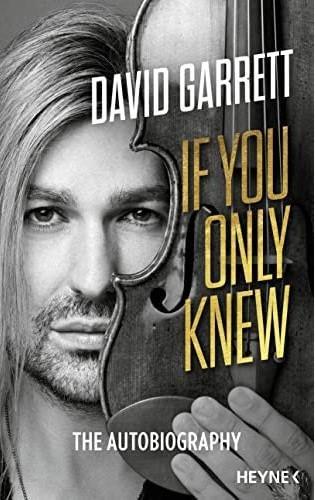Tully Potter reviews the memoir of superstar violinist David Garrett

If You Only Knew: The Autobiography
David Garrett
336PP ISBN 9783453218543
Heyne Verlag €22
Some violinists have fidgety feet, others have fidgety fingers. David Garrett has a ‘phygital’ book, which he defines as a cross between physical and digital. If you scan the QR code at the end of each chapter, you can find videos and photos; but as QR codes are foreign to me, you will forgive me if I stick to the written text.
For me the book starts with Chapter 2. Back in 1985, Henryk Szeryng was playing in Aachen, where David Christian Bongartz was born on 4 September 1980. Father and mother were going and they took David along. Szeryng could hardly fail to notice the little boy imitating him in the fourth row; and before he played an encore, he pointed his bow at David and said: ‘When I was the same age as this little boy… I listened to Fritz Kreisler in concert.’ And he played the encore Kreisler had dedicated to him all those years before, Tempo di Minuetto. Not long after that, father Georg gave David his first violin.
He writes about the difficulties of playing the violin, and comes to the conclusion that ‘it is a nearly impossible instrument’. But somehow he survived the tortures through which he put himself – and those around him. He was lucky that his father was a violin auctioneer and teacher, though Georg was a typical prodigy-pushing parent. When his elder brother gave up, his father concentrated on David. ‘Did I suffer? Yes, of course I did.’ The compensation was that ‘I was making classical music, the most magnificent music on earth.’
His first teacher other than his father was Coosje Wijzenbeek in Hilversum – she also taught Janine Jansen. Then he went to Saschko Gawriloff in Cologne and later Zakhar Bron in Lübeck. At nine he earned 500 marks for playing Mozart’s B flat Concerto at the Kurhaus in Bad Kissingen – his father pocketed the money. At ten he had a professional manager and a new name, David Garrett. After playing the Tchaikovsky Concerto first movement to Ida Haendel, he won her over as a mentor for four years.
He had an unsatisfactory spell at the Royal College in London but did better with Juilliard and Itzhak Perlman, by which time he was already a recording star. He called himself Christian Bongartz at Juilliard and one day Perlman said: ‘I’ve been wondering for months… are you perhaps David Garrett?’
Watch: Which Strad will violinist David Garrett choose?
Read: My whirlwind journey to owning a Guarneri ‘del Gesù’: David Garrett
Read: ‘I wasn’t even sure if I wanted to play the violin any more’ – David Garrett
Up to the turn of the century, he had a fairly orthodox classical career, giving concerts and recording with such conductors as Mehta and Abbado, but the desire to be more and more popular seems to have taken him over. I must confess to being one of the tut-tutters, even though I can appreciate his desire to connect with young people and break down concert barriers. Like many before him – Heifetz, Huberman, Kreisler, Busch, Stern – he will happily play three concertos in one evening. He does not mind his audiences clapping between movements, pointing out that it used to be common practice.
As I find Garrett’s ‘crossover’ videos on YouTube depressing, it is good to know that in May 2021 he recorded a CD of pieces associated with his childhood idols Menuhin, Kreisler, Heifetz and Milstein. He is candid about his love affairs and has an ongoing one with the violin. He was distraught when he fell on his Guadagnini (it was repaired) and later got a 1716 Strad. A long-term dream was to own a Guarneri ‘del Gesù’ – and he achieved it last year with the c.1736 ‘Régis Pasquier’, about which he wrote for The Strad.
TULLY POTTER











































1 Readers' comment